Section 7: LITHUANIA IN THE WORLD


THE VOICE OF INTERNATIONAL LITHUANIA
|
VilNews has its own Google archive! Type a word in the above search box to find any article.
You can also follow us on Facebook. We have two different pages. Click to open and join.
|
Thu, 19th April, 2012 - Posted by - (2) Comment
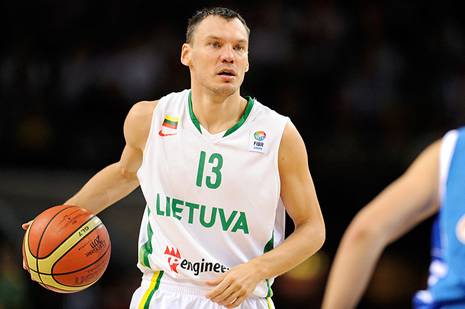
Šarūnas Jasikevičius, during EuroBasket 2011.
Text: Vin Karnila
Mention the words Sport and LITHUANIA and the next word you hear is always BASKETBALL. While a number of Lithuanian players have gone on to careers in the NBA it may surprise you to find out that quite a few Lithuanian athletes have had successful professional careers in the U.S.A. in other sports as well. What may be even a little more surprising is that these athletes excelled in what are considered “American” sports. As an example, did you know that the two players that most people say were the greatest players in the National Football League were Lithuanians?
BASKETBALL
Basketball is the sport that has tied Lithuania and USA closest together, so let’s first introduce you to the Lithuanian basketball stars “over there”.
Sarunas Jasikevičius
In July 2005 Sarunas Jasikevičius signed a three year contact with the Indian Pacers of the NBA. The point guard, who won three consecutive Euroleague championships, agreed to a three-year deal with the Pacers. Back in 1998, he was a solid wing player with Maryland, known for his shooting and intelligent play. He went back to his native Lithuania and plied his skills in club ball in Europe, becoming one of the best at his position. Arunas said “European ball is getting closer to the level of the NBA. I don't feel I have to play there to prove myself as a player,“
Thu, 19th April, 2012 - Posted by - (3) Comment

Johny Podres, Lithuanian American, son of immigrant parents, born and raised Upstate New York, pitched two historic World Series wins against the New York Yankees in 1955. The World Series championship was the one and only victory in the history of the "Brooklyn" Dodgers. Subsequently, the Dodgers (and Podres) moved to Los Angeles in 1958.
People always said the cigarettes and the gambling and the whiskey and the late hours would surely get Johnny Podres. In 2008, those experts were proved right. Now they’re going to have to explain how The Pod made it to 75.
Tue, 17th April, 2012 - Posted by - (2) Comment

By Ellen Cassedy
More than 200 scholars from 15 countries are converging on Chicago – home to the largest population of Lithuanians outside of Lithuania itself – to present and respond to papers on Baltic history, literature, linguistics, political science, aesthetics, culture, sociology, psychology, economics, gender, anthropology, musicology, environment, education, and public health.
The 23rd biennial conference of the Association for the Advancement of Baltic Studies (AABS) opens April 26 at the University of Illinois. Organizers expect the conference to be the largest ever for the scholarly association, which was founded in 1968.
Members of the public are invited to attend the opening session, where the Lithuanian, Latvian, and Estonian ambassadors to the U.S. will speak on the conference theme: “The Global Baltics: the Next 20 Years.”
The session will take place at 1:30 p.m. at the Forum at the University of Illinois, 725 West Roosevelt Road, Chicago, IL 60608. For further information, contact Agnė Vertelkaitė, 312-397-0382, ext. 204, or e-mail: agne@ltconschi.org.
U.S. Senator Dick Durbin of Illinois, who is of Lithuanian descent, will address the three-day conference on Friday, April 27, on the topic of “The Unbreakable U.S.-Baltic Partnership.”

Tue, 17th April, 2012 - Posted by - (0) Comment
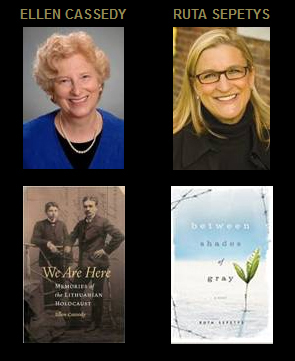
Join Ellen Cassedy, author of We Are Here: Memories of the Lithuanian Holocaust, and Ruta Sepetys, author of Between Shades of Gray, her best-selling novel about the Siberian deportations, as they share – and compare – their journeys into Lithuania’s dark years, and offer hope for the future.
BALZEKAS MUSEUM OF LITHUANIAN CULTURE
6500 S. PULASKI ROAD CHICAGO, IL 60629
TEL.: 773.582.6500
FAX: 773.582.5133
Open 10 AM - 4 PM daily
Sun, 15th April, 2012 - Posted by - (3) Comment
This is the story of Vanda and her family. A story similar to what happened to many families that were affected by World War II's terrible events on Lithuanian soil, a story about innocent children who wanted a normal childhood in their beloved homeland, but instead were hit hard by the horrors of war and the terrible atrocities committed by the Hitler and Stalin regimes. Vanda and her parents managed to escape before Stalin's Red Army laid its iron grip over Lithuania in 1944. They came to Germany and later to the United States. Vanda's aunt had no such luck; she was deported to Siberia and starved to death because she shared her food rations with other deportees.
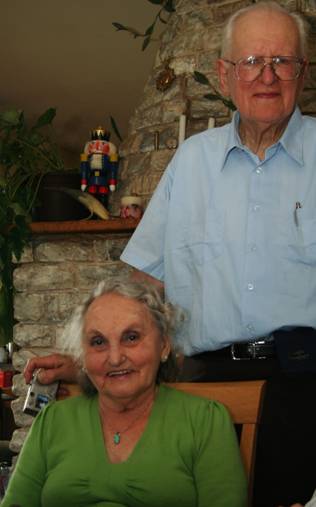
Vanda with her husband, Vytautas Sliupas, in June 2010.
They live in California.
Photo: Aage Myhre
KAUNAS 1938:
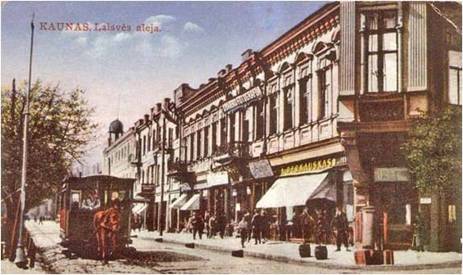
Vanda in 1938: “I remember being at the photographer’s and once walking in Kaunas on “Laisves Aleja” and eating the first sausage and a bun (something like a hotdog) on the street – which to me was a big treat.”
CHICAGO 1949:

Chicago became Vanda’s new home in 1949. Here a photo from the Grand
and Harlem intersection, appears to be Christmas Season.
>From NW Chicago history site.
Sun, 15th April, 2012 - Posted by - (0) Comment

WWII: Occupied by Russia in 1940, Germany in 1941 and Russia in 1944
In June 1940, the Soviet Union occupied and annexed Lithuania in accordance to the secret protocols of Molotov–Ribbentrop Pact.
200,000 Jews murdered during Lithuanian Holocaust, 1941-1944
A year later the Soviet Union was attacked by Nazi Germany, leading to the Nazi occupation of Lithuania. The Nazis and their collaborators murdered around 200,000 Jews of Lithuania (more than 90% of the pre-war Jewish community) during the Holocaust.
300,000 deported to Siberia, 1940-1953
After the retreat of the German armed forces, the Soviets re-established the annexation of Lithuania in 1944. It followed with massive deportations of around 300,000 citizens to Siberia, complete nationalisation and collectivisation and general sovietisation of everyday life.
Tens of thousands Lithuanians fled to the West, 1940-1944
During World War II many fled west to escape the Russian reoccupation of Lithuania. Eventually 30,000 Dipukai (war refugees or displaced persons) settled in the United States, primarily in cities in the East and the Midwest. These immigrants included many trained and educated leaders and professionals who hoped to return someday to Lithuania. The heightening of tensions between the United States and the Soviet Union—known as the Cold War—dampened these expectations, and many Lithuanians sought to create a semi-permanent life in the United States.
By 1990 the U.S. Bureau of the Census listed 811,865 Americans claiming "Lithuanian" as a first or second ancestry.
Europe’s longest and bloodiest guerrilla war in modern times, 1944-1953
From 1944 to 1953 approximately 100,000 Lithuanian partisans fought a guerrilla war against the Soviet system. An estimated 30,000 partisans and their supporters were killed, and many more were arrested and deported to Siberian gulags. Around 70,000 Soviet soldiers were killed by the partisans.
It is estimated that Lithuania lost almost one million people during and after World War II, one third of its population.
Regained freedom and independence, 1990-1991
The advent of perestroika and glasnost in the late 1980s allowed the establishment of Sąjūdis, an anti-communist independence movement. After a landslide victory in elections to the Supreme Soviet, members of Sąjūdis proclaimed Lithuania's independence on 11 March 1990, becoming the first Soviet republic to do so. The Soviet Union attempted to suppress the secession by imposing an economic blockade. Soviet troops killed 14 Lithuanian civilians on the night of 13 January 1991.
Worldwide recognition of independence and member of the UN, 1991
After the Moscow Coup in August 1991, independent Lithuania received wide official recognition and joined the United Nations on 17 September 1991. The last Soviet troops left Lithuania on 31 August 1993 – even earlier than they departed from East Germany.
Member of EU and NATO, 2004
Lithuania, seeking closer ties with the West, applied for NATO membership in 1994. After a transition from a planned economy to a free market one, Lithuania became a full member of NATO and the European Union in the spring of 2004 and a member of the Schengen Agreement on 21 December 2007.
Sun, 15th April, 2012 - Posted by - (3) Comment
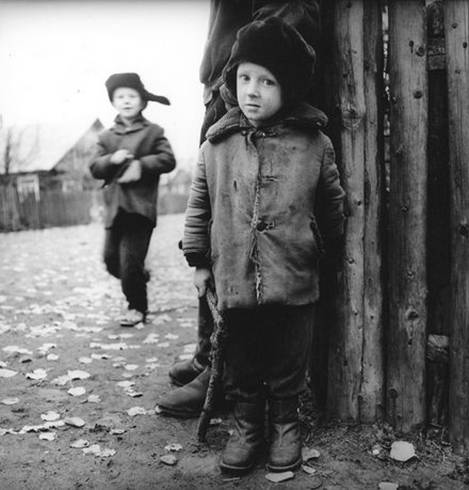
Village street, Dzūkija 1969.
PHOTO: ANTANAS SUTKUS.
It must have been quite a shock for the surviving deportees to return ‘home’ from Siberia to Lithuania in the 1950s and 1960s. The country they had loved and cared so much about was now ruled, mismanaged, by Moscow-believing Communists.
Since 1941 more than 300.000 persons had been deported to Siberia, with tens of thousands dying en route to or on the permafrost. Tens of thousands of the country's leading women and men had fled to America and other nations in the west.
The 1950s was the decade when Lithuania's 10-year guerrilla war against the superior Soviet forces had finally come to an end, with the result that 22.000 Lithuanian forest brothers and about 70.000 Soviet soldiers had lost their lives, thus the longest and bloodiest guerrilla war of modern Europe.
Lithuanian daily life during the 1950s and 1960s was characterized by terrifying KGB activities, denunciations, imprisonments and executions without trial, widespread corruption and mismanagement in which most of the good, democratic principles many fine people had fought so hard for during the interwar period were totally forgotten and disregarded.
People felt despair, discouragement, fear ... But also a vain hope - that Western countries would come to liberate their dear homeland from the Soviet tyranny...
To see more Antanas Sutkus photos, go to:
http://www.ananasamiami.com/2011/04/photography-by-antanas-sutkus.html
Fri, 13th April, 2012 - Posted by - (7) Comment

Boris Vytautas Bakunas
By Dr. Boris Vytautas Bakunas, Ph. D., Chicago
A wave of unity swept the international Lithuanian community on March 11th as Lithuanians celebrated the 22nd anniversary of the Lithuanian Parliament’s declaration of independence from the Soviet Union. However, the sense of national unity engendered by the celebration could be short-lived.
Human beings have a strong tendency to overgeneralize and succumb to stereotypical us-them distinctions that can shatter even the strongest bonds. We need only search the internet to find examples of divisive thinking at work:
”50 years of Soviet rule has ruined an entire generation of Lithuanian.”
”Those who fled Lithuania during World II were cowards -- and now they come back, flaunt their wealth, and tell us ‘true Lithuanians’ how to live.”
”Lithuanians who work abroad have abandoned their homeland and should be deprived of their Lithuanian citizenship.”
Could such stereotypical, emotionally-charged accusations be one of the main reasons why relations between Lithuania’s diaspora groups and their countrymen back home have become strained?
As psychiatrist Dr, Aaron T. Beck and others have noted, accusatory remarks are often perceived as threats by those targeted for verbal attack. Recriminations follow and escalate into verbal shooting matches that solidify hostilities between individuals and groups that previously enjoyed friendly relations.
Fri, 13th April, 2012 - Posted by - (0) Comment
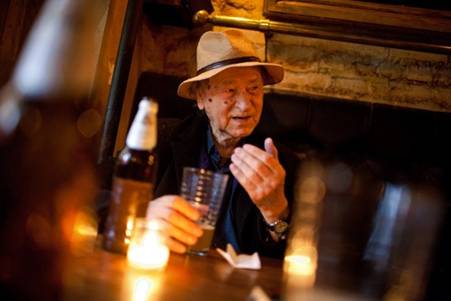
Filmmaker Jonas Mekas has a drink at Cafiero Lussier on East Second Street.
Ramsay de Give for The Wall Street Journal
Now 90 years old, Lithuanian-American filmmaker and archivist Jonas Mekas has spent a third of his life drinking at the Mars Bar in New York. The dive at the corner of Second Avenue and First Street opened in the early 1980s, when Mr. Mekas was busy renovating the future site of his Anthology Film Archives, a block away.
"We came into existence together, so it was friendship," Mr. Mekas said this week, chatting over Lithuanian beer and vodka shots at the Anyway Cafe, one of several East Village bars he frequents more often since Mars Bar closed last June (and was subsequently demolished). The demise of the bar, a refuge for the neighborhood's old-school bohemians, artists and rogues, prompted the filmmaker to edit more than 15 years of casual video footage into "My Mars Bar Movie." It will open a weekend run at Anthology today, Friday 13 April.
Watch the first five minutes of Jonas Mekas’s Mars Bar movie, opening today, Friday 13 April
Wed, 11th April, 2012 - Posted by - (0) Comment
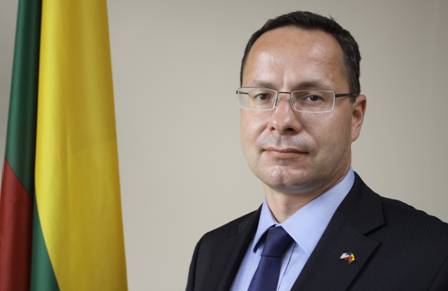
Lithuania’s ambassador to the United States, Žygimantas Pavilionis
Ambassador Žygimantas Pavilionis interviewed by Aage Myhre
Ambassador, you represent Lithuania in the United States, a country where around one million Lithuanians and people of Lithuanian descent live, as citizens of the United States. Are you to a certain degree also their ambassador?
As an ambassador of the Republic of Lithuania, I represent, first of all, interests of my country and my fellow citizens. Not all Lithuanian Americans are citizens of Lithuania, but they, nevertheless, kept close ties to their Homeland and helped greatly to keep memories of independent and free Lithuania alive. All the Lithuanians no matter where their live are equally important share of our nation. This is not only the official position of our Government, but also my personal idea I always had and believed in. Therefore, yes, I am to certain degree their ambassador as well.
Lithuanian-Americans played a significant role in the postwar years, until Lithuania's recovered independence in 1990-1991, by constantly exerting pressure on the U.S. President and leaders in other Western countries so that they would pressure the Soviet Union to allow the Baltic countries freedom after the Soviet occupation taking place during World War II. Now, as more than 20 years have passed since the freedom bells rang, the question is whether the Lithuanian-Americans have a role to play also today? See our article https://vilnews.com/?p=8899
We in Lithuania will never forget and never underestimate the role of Lithuanian Americans in our struggle for independence. It will remain an indispensable part of our history. However, it sounds sometimes a bit strange when I hear that the mission of our countrymen abroad might be over. Not at all! Free, democratic and Western minded Lithuania we fought for and we have now is not the fact that will last forever by itself. On the contrary, we must remember that state-building is a continuous process, which requires our personal everyday efforts. So there are a lot of challenges both in our foreign and domestic policy we are facing now where the help and support from the Lithuanian diaspora is of vital importance. Economy, energy, security issues, education, social affairs– those and many other areas where we need our common work on it. To be more concrete and to illustrate what has been said I would like to name at least two significant projects which our Embassy is going to undertake together with the Lithuanian community in US this year - NATO Summit in May and World Lithuanian Economic Forum in September. Both evens will take place in Chicago, but we do expect an active engagement of Lithuanians from all over United States in them.
“The majority, I believe, are disappointed and discouraged with the present president’s seemingly unfriendly view toward Lithuanian-Americans and others abroad.” This said Regina Narusiene, President of the World Lithuanian Community, in a recent interview (see https://vilnews.com/?p=6704), based on a comment referred to in The Baltic Times, where President Grybauskaite should have said that most prominent U.S. Lithuanian emigres, instead of focusing on developing U.S. - Lithuanian business ties, prefer providing political advice to the Lithuanian authorities, which may not be that necessary nowadays. She was supposedly “disappointed by Lithuanian emigres’ inability to attract U.S.-based investments to Lithuania.” Here in VilNews we often hear Lithuanian-Americans say they do not feel welcome to their home country, and that Lithuania's current president seems to antagonize them. What are the ambassador's comments to this?
I would like to comment the words of President which I haven’t heard myself, but as far as I’m familiar with the position of President Grybauskaite towards Lithuanian diaspora I could only presume that these words were taken out of the context and that the President didn’t mean at all anything that could be interpreted as an “unfriendly view toward Lithuanian-Americans and others abroad”…
Having said that I might add that Lithuanians are well known in the U.S. for their persistence, hard and committed work and interesting achievements. We know Lithuanians from every generation who became successful politicians, businessmen, artists, social workers, etc. Just look at our honorary consuls – people like Krista Bard or Daiva Navarette are known in their areas of expertise. We also know a lot of Lithuanians from a younger generation who are well established in universities, research labs, have created their businesses. And some of them very successfully extended their business in Lithuania. Do you know that the company “VPA Logistics”, which operate the block train corridor project from Klaipeda to China, called “Sun”, was created by American-Lithuanians from New Jersey? And this project was developed with a great support of the government and the President itself. And there are much more concrete examples were Lithuanian Americans has invested, developed business in Lithuania or with Lithuania, but they have not yet very much advertised that.
| VPA Logistics – excellent example of business venture established by a Lithuanian American Mr. Vytautas ‘Victor’ Paulius is the Lithuanian American who founded the New Jersey company VPA (Vytatuas Paulius Associates) in 1967. UAB VPA was established in Lithuania’s port city Klaipeda in 1996, currently owning & operating over 30,000 sq.m. (320,000 sq.ft.) of state of the art cold storage space located within the Port of Klaipeda and Laistu International Trade Center (LITC), adjacent to Klaipeda State Seaport. VPA Logistics is the company behind the new SUN TRAIN that operates between China and Klaipeda. |
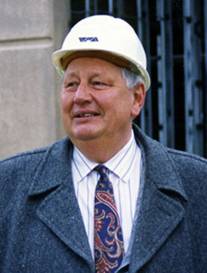 VYTAUTAS "VICTOR" PAULIUS |
Wed, 11th April, 2012 - Posted by - (3) Comment
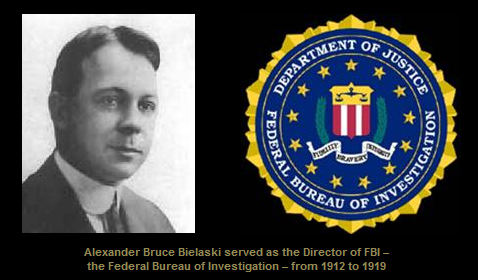
Many have heard of the legendary Director J. Edgar Hoover who led the FBI from1924 to 1972, but few have heard of the name Alexander Bruce Bielaski who served as the Director of the Federal Bureau of Investigation from 1912 to 1919. FBI was established in 1908, and Bielaski was its second Director.
Even fewer know that Bielaski was of Lithuanian origin. Although his family name was Polonized over time, his family roots can be traced directly back to Lithuania. His grandfather, Captain Alexander Bielaski (Beleskis) had been born on August 1, 1811, in Lithuania.
The FBI Director’s sister, Ruth Bielaski Shipley
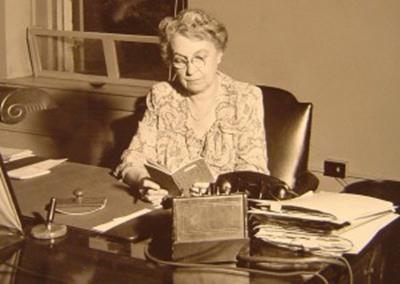
Ruth Bielaski Shipley
Another rather unknown story among Lithuanian Americans, is that Ruth Bielaski Shipley (April 20, 1885 – November 3, 1966) was head of the Passport Division of the United States Department of State for 27 years from 1928 to 1955. In 1951 TIME called her "The most invulnerable, most unfirable, most feared and most admired career woman in the U.S. Government."
Thu, 15th March, 2012 - Posted by - (1) Comment
 The harbour seal is found along temperate and Arctic marine coastlines of the Northern Hemisphere. |
 Hans Egede (1686 – 1758) was a Norwegian missionary, known as the Apostle of Greenland. |
Many of us remember our Lord’s Prayer, or Pater Noster as many call the most outstanding prayer of Christianity. One phrase goes as follows: “Give us this day our daily bread,..” This became an ever so slight nut to crack for the North Norwegian priest Hans Egede when he came to Greenland to preach in the 1700s. The indigenous people who populated the world's largest island, the Inuits, did not know what bread was!
But the priest found a solution, and in his translation to Inuit language the phrase became therefore logically enough, "Give us this day our daily harbour seal." Because it was these seals that were the most important element of the Inuit food chain at the time...
It was Hans Egede, often called the Apostle of Greenland, who founded the town of Nuuk (Godthåb), capital of today's Greenland. His statue stands solidly on its base in the outskirts of the town.
Nuuk (Godthåb), the capital of Greenland, offers colourful architecture where the winter bites as coldest
 I sit at Kastrup Airport near Copenhagen, Denmark, an early February morning. Waiting to border the Scandinavian Airlines flight to Kangerlussuaq Airport in Greenland. Then comes the message: The flight is cancelled. Luckily I get on a plane from Greenland Air, and a couple of hours later I am sitting in a red Boeing 757 heading northwest. I have been awarded a seat between two mildly said overweight Inuits, Eskimoes as we used to call them in the past. It smells of sweat and I am unable to find room for my arms on the armrests. After four and a half hour of torment we land in the icy wilderness. The temperature outsideis -40C, inside the terminal building it is a little warmer. But not much.So I'm very happy when I finally, after several hours waiting time, get on board a red propeller plane, a Dash 7, flying me to Greenland's capital Nuuk further south on the island. The trip takes only an hour.
I sit at Kastrup Airport near Copenhagen, Denmark, an early February morning. Waiting to border the Scandinavian Airlines flight to Kangerlussuaq Airport in Greenland. Then comes the message: The flight is cancelled. Luckily I get on a plane from Greenland Air, and a couple of hours later I am sitting in a red Boeing 757 heading northwest. I have been awarded a seat between two mildly said overweight Inuits, Eskimoes as we used to call them in the past. It smells of sweat and I am unable to find room for my arms on the armrests. After four and a half hour of torment we land in the icy wilderness. The temperature outsideis -40C, inside the terminal building it is a little warmer. But not much.So I'm very happy when I finally, after several hours waiting time, get on board a red propeller plane, a Dash 7, flying me to Greenland's capital Nuuk further south on the island. The trip takes only an hour.
Tue, 13th March, 2012 - Posted by - (0) Comment
Lithuanians all over the globe have during the past month been busy celebrating the country's national days and more. The Lithuanian spirit is alive and well in all corners of the world!
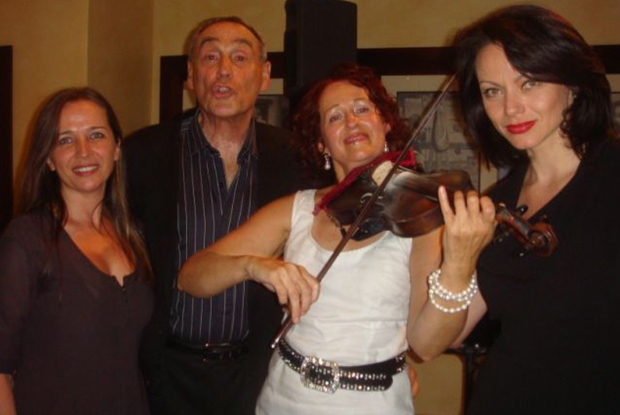
Johannesburg, South Africa
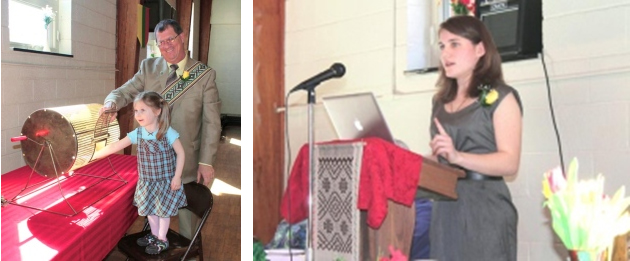
Frackville, Pennsylvania, USA
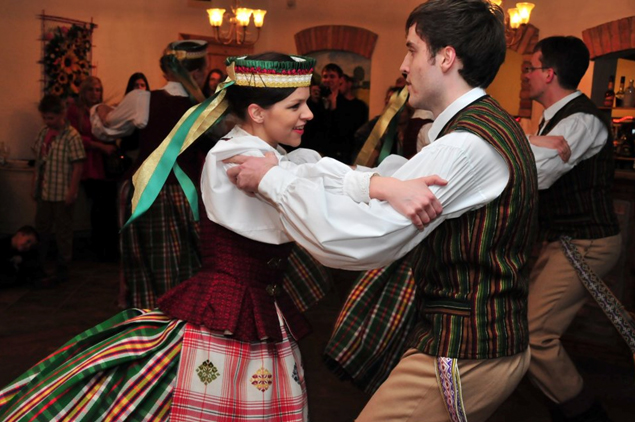
Stockholm, Sweden
Tue, 22nd November, 2011 - Posted by - (1) Comment

The chess game that Pedro’s father made by his own hands.
Photo: Aage Myhre.
My friend, a journalist with the name Pedro, from Chile, gave me this chess game in 1987. At the end of the 1970s he had become victim of the military rule of Dictator Augusto Pinochet in his home country. Pedro had written some slightly critical comments about the General in his newspaper, and was given 24 hours to disappear out of Chile. The chess game was the only thing he brought with him in the backpack, except the bare necessities of clothing and food. It was his father who had carved the beautiful pieces out of wooden blocks, and the game was, therefore, the dearest object Pedro owned. He had over some time come to live in political asylum in Norway and had lived in Oslo for a few years when I met him. After a time of acquaintance he gave the chess game to me. He explained the reason: "You are the first and only Norwegian I have been able to communicate with, the only one who has shown me respect and interest since I came here."
The chess game I got from Pedro is standing here, next to me. Just to look at it makes me think. I think of a father who sat for months and cut out each individual shape very accurately and carefully from pieces of wood he had collected. I know that Pedro had been seeking asylum in Norway because he had told the truth about the abuser Pinochet. I know he spent several years in Norway without being met with genuine interest and love. The fact that my nation’s people, so quick and clever when it comes to aid and support of other peoples, not always is very good at communicating face-to-face with people who desperately need someone to talk to.
I'm glad I could play a role in Pedro's life. I am very grateful for the gift he gave me. The dearest object Pedro owned has become extremely dear to me. For all that it represents and communicates.
Thanksgiving Day is Thursday 24 November
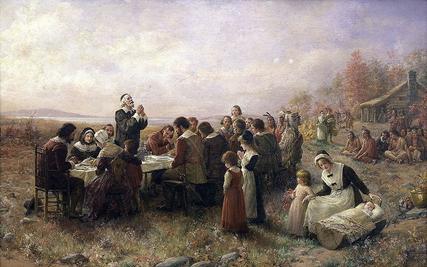
The First Thanksgiving at Plymouth.
By Jennie A. Brownscombe. (1914).
Wed, 16th November, 2011 - Posted by - (1) Comment

“More than national pride, being Lithuanian is a state of mind.” This can be read at a new Facebook page, “Lithuanians of Arizona”, which was recently established.
Some active individuals among the approximately 10 000 Lithuanians who live in this hot state at the border of Mexico have decided to create a new communication platform to better achieve dialogue and information exchange between all Lithuanians who live in the state. The initiative for the Facebook page was taken after a large picnic event early this November. This is what the initiators write:
“During the annual Arizona Lithuanian Community Picnic in Tumbleweed Park, in Chandler, Arizona, we decided to start a Facebook group to complement the www.lithaz.org web site. This group is dedicated to Lithuanians in Arizona, around the world, or to anyone who is Lithuanian in mind and spirit.”
VilNews applauds the initiative, and we are happy to make our columns available to news updates and information from Arizona and other states or countries where Lithuanians live!
Lithuanians Of Arizona are now on Facebook.
Click here to join them!
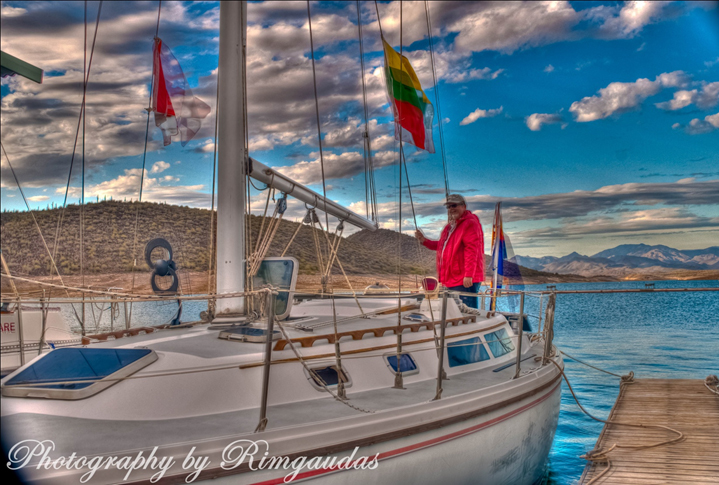
"I found the Lithuanian Flag at Scorpion Bay Marina, Lake Pleasant Arizona, United States of America aboard "Miss Behavin III". 12 November 2011.
Photography by Rimgaudas
Rimgaudas P. Vidziunas aka "Rim", Mesa, Arizona…
Wed, 16th November, 2011 - Posted by - (1) Comment
|
Lithuanians started to come to Arizona before World War I. Then, as now, it was the warm and dry climate of Phoenix and Tucson, located in the desert regions of southern Arizona, that attracted them. The first Lithuanians came to Arizona to recover from lung illnesses, rheumatism or arthritis. Being ill and few in number, they did not leave a major cultural legacy. Where is Arizona? Read more about Arizona at: |
U.S. Census:
|
VilNews e-magazine is published in Vilnius, Lithuania. Editor-in-Chief: Mr. Aage Myhre. Inquires to the editors: editor@VilNews.com.
Code of Ethics: See Section 2 – about VilNews. VilNews is not responsible for content on external links/web pages.
HOW TO ADVERTISE IN VILNEWS.
All content is copyrighted © 2011. UAB ‘VilNews’.